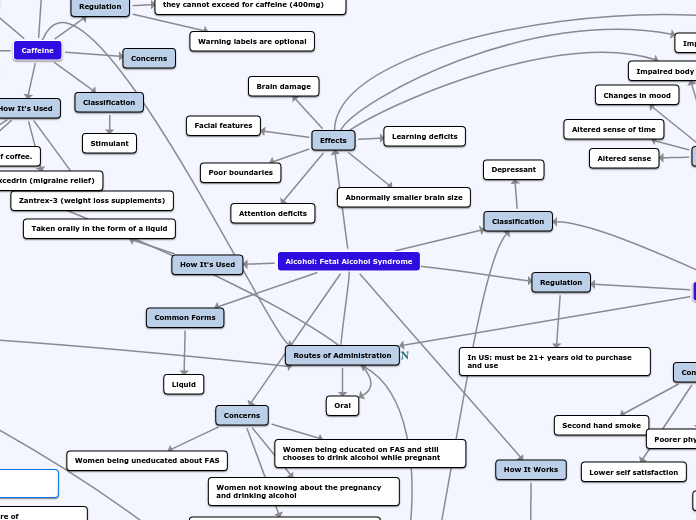作者:Rosa Badillo 6 年以前
253
HE 366 Concept Map Assignment

Psychedelics
Ketamine
PCP
MDMA
Mushrooms
Mescaline
DMT
Acid
Subtopic
Serious mental health issues
May result In physical harm because of changed perception/judgement
Possibility of toxicity and overdose
Changes in heart rate
Changes in cognitive abilities
Changes in digestion
Changes sleep patterns
Opiods
Regulations
Tabacco
E-cigarettes/Vape pens
Hookah
Smokeless
Pipe
Cigarettes/cigars
2018: FDA requires health warning statements on tobacco products/advertisements
1998: Master Settlement Agreement
1997: Federal workplaces now smoke-free
1971: Cigarette Ads banned from TV and radio
Increasing amount of youth smoking e-cigarettes or vaping
Depressant and Inhalant Use
Opiates
Barbiturates
Benzodiazepines
Alcohol
decreased anxiety
Muscle relaxation
Sedating
Slowing down psychomotor skills
Vomiting
Nausea
Disrupted sleep
Slurred speech
Talkativeness
Dizziness
Disinhibition
Inhibits perceptual abilities
Unhealthy habits common to brain circuitry
Heightens learning potential
Problems with memory
Reduces ability to experience pleasure
38 U.S. states have restrictions on the sale and distribution to minors of commonly used inhalants
Not regulated by Controlled Substances Act
interferes with neurotransmitters
Inhaling or ingesting volatile solvents, aerosols, gases, and nitrites
Meth
Benzedrine
Crystal
Consistent use of meth results in difficulty in feeling pleasure for things
Tricks neurons in the brain to thinking it is dopamine
Affects the brain structures that contain dopamine the most
Increased costs for medical services and emergency room use for meth users and producers
Property damage from fires, explosions, decontamination costs, and loss of rent.
Severe dental problems, organ failure, death due to stroke
Premature delivery, heart and brain problems, low birth weight and separation of placenta from the uterus
paranoia and delusions
Weight loss
Violent behavior
Hallucinations
Insomnia
Confusion
Anxiety
Decreased appetite
Increased wakefulness and physical activity, heart rate, blood pressure, breathing
OR: Unlawful possession of methamphetamine
OR: Unlawful delivery of methamphetamine within 1,000 ft of school
OR: Unlawful delivery of methamphetamine
OR: Unlawful manufacture of methamphetamine within 1,000 ft of school
OR: Unlawful manufacture of methamohetamine
Illegal in the U.S. since 1970
Always ends up in the bloodstream
Circulates the brain
Parenteral
Nasal
Ingested
Taken as a pill
Snorting
Smoking
Injecting with a needle
Caffeine
Caffeine blocks adenosine from making us sleepy
Every hour we are awake adenosine rises in our brain and we feel tired
Adenosine acts as a central nervous system depressant
Warning labels are optional
Energy drinks have "upper limit" for which they cannot exceed for caffeine (400mg)
No FDA requirement for food and beverages to have the amount of caffeine on the product's label
Stimulant
Mobilizes intercellular calcium release from sarcoplasmic reticulum
Acts as a diuretic
Increases blood pressure and heart rate
Chocolate
Soda
Energy Drinks
Tea
Coffee
Excedrin (migraine relief)
Zantrex-3 (weight loss supplements)
Vivarin (caffeine pill)
OTC medication is used in place of coffee.
Cannabis
Regulation
In US: must be 21+ years old to purchase and use
Routes of Administration
Oral
More relationship problems
Poorer physical health
Poorer mental health
Lower self satisfaction
Second hand smoke
Psychosis (when taken in high doses)
Delusions (when taken in high doses)
Hallucinations (when taken in high doses
Impaired memory
Difficulty with thinking/problem solving
Impaired body movement
Changes in mood
Altered sense of time
Altered sense
THC quickly passes from the lungs into the bloodstream and the blood carries the chemical to the brain and other organs throughout the body.
THC-rich resins
Marijuana mixed in food (edibles)
Pipes or water pipes (bongs)
Hand rolled cigarettes
Cannabis Indica Plant
Cannabis Sativa
Alcohol: Fetal Alcohol Syndrome
Concerns
Women being educated on FAS and still chooses to drink alcohol while pregnant
Women knowing about the pregnancy and still drinking alcohol
Women not knowing about the pregnancy and drinking alcohol
Women being uneducated about FAS
Effects
Learning deficits
Abnormally smaller brain size
Attention deficits
Poor boundaries
Facial features
Brain damage
How It Works
Babies are born with this when their mother drinks while they are pregnant with the baby
Classification
Depressant
How It's Used
Taken orally in the form of a liquid
Common Forms
Liquid

